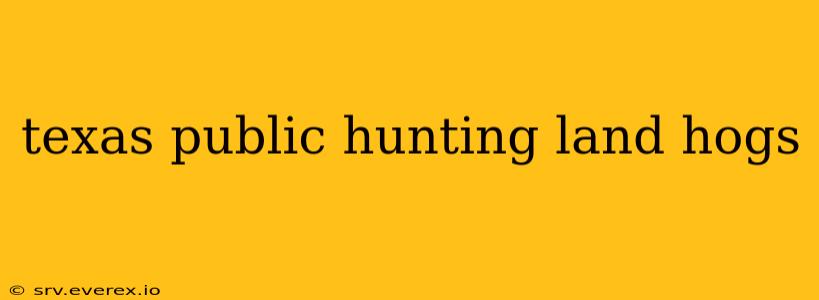Texas boasts abundant public lands perfect for hunting wild hogs, a significant agricultural pest impacting the state's economy and environment. This guide explores the opportunities available to hunters looking to participate in hog control efforts on public land.
Finding Public Hunting Lands in Texas
Several agencies manage public hunting land in Texas, offering varied opportunities for hog hunting. The primary resources include:
1. Texas Parks and Wildlife Department (TPWD)
The TPWD manages a vast network of wildlife management areas (WMAs) across the state. Many of these WMAs allow hog hunting, often with specific seasons, permits, and regulations. Check the TPWD website for a detailed map and information on individual WMAs, including hunting regulations, accessibility, and any required permits. Remember that regulations can change, so always confirm the current rules before your hunt.
2. U.S. Forest Service
National forests in Texas also offer hunting opportunities, including hog hunting in designated areas. The Forest Service's website provides details on regulations, maps, and required permits for hunting on their lands. Similar to TPWD lands, understanding and adhering to their specific guidelines is crucial.
3. Other Public Lands
Other public lands, such as those managed by the Bureau of Land Management (BLM) or the Army Corps of Engineers, may also offer limited hog hunting opportunities. Always check with the specific land management agency for the most up-to-date information on regulations and access.
Preparing for Your Hog Hunt on Public Land
Successful hog hunting on public land requires planning and preparation:
1. Obtain Necessary Permits and Licenses
Before you head out, ensure you have all required hunting licenses and permits. This typically includes a Texas hunting license and any specific permits required for the WMA or public land you plan to hunt. Failure to comply with licensing requirements can result in substantial fines.
2. Understand Hunting Regulations
Thoroughly review the specific regulations for the chosen WMA or public land. Pay close attention to:
- Hunting seasons: Hog hunting seasons vary by location and may have specific dates and times.
- Bag limits: There may be restrictions on the number of hogs you can harvest.
- Methods allowed: Some WMAs may restrict the use of certain hunting methods, such as night hunting or the use of specific types of ammunition.
- Safety requirements: Familiarize yourself with safety regulations and best practices for hunting.
3. Plan Your Trip
Proper planning is essential for a safe and successful hunt. Consider:
- Location scouting: If possible, scout the area beforehand to identify potential hog activity.
- Access: Determine how you'll reach your hunting location, considering terrain and weather conditions.
- Gear and equipment: Pack appropriate clothing, gear, and hunting equipment, including a reliable firearm, ammunition, and a means of field dressing and transporting your harvest.
- Safety: Inform someone of your hunting plans, including your location and expected return time. Bring a first-aid kit and a communication device.
Ethical Hunting Practices
Ethical hunting practices are paramount. Remember to:
- Respect wildlife: Hunt responsibly and only harvest what you need.
- Respect other hunters: Maintain safe distances from other hunters and be mindful of your actions.
- Leave no trace: Pack out all trash and debris, leaving the area as you found it.
By following these guidelines and utilizing the resources provided by the various land management agencies, Texas hunters can enjoy safe and successful hog hunts on public lands while contributing to vital wildlife management efforts. Remember to always prioritize safety and ethical hunting practices.
